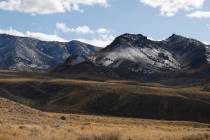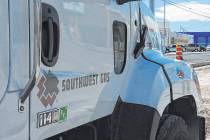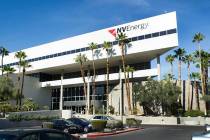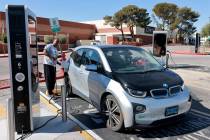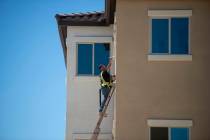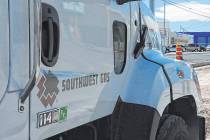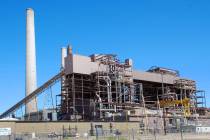Time for Nevada to seek long-term, permanent revenue solutions
To the editor:
I fail to understand the rationale behind the governor's apparent refusal to recognize that the state of Nevada finally has reached a point in its history when the state needs to find a consistent source of income.
There are people in this state who somehow believe that government services should not be paid for by their very users, the citizens. It was a wonderful situation when gaming could support Nevada. We relied on others to provide the funding that paid for our public works, health and human services, our justice system and public education.
Well, times have changed. Nevada no longer has the corner on gaming. And then we have our current national economic crisis. Times are tough.
To help alleviate this recession, our governor is not seeking to establish any long-term, permanent solution. Instead, he proposes that state workers and teachers pay for the state's debt. He has not asked all the citizens of Nevada to pay the state's expenses (in some places this is called a tax, but heaven forbid Nevada should have a structured, fair tax). No, only some Nevadans will pay.
I wonder, if the 6 percent pay cut for state workers isn't enough. Perhaps we could ask an additional identified group of people to pay -- perhaps those with blue eyes or people who watch TV.
State workers and educators are employees. They work for a living, so why should they be fined in order to pay for the state's budget deficit? Doesn't it make more sense, and wouldn't it be better for Nevada, if everyone were invested in the state's economic recovery and paid a little, rather than a small group paying a lot? How about if everyone is fined at, say, 2 percent, rather than a small group paying 6 percent? We can call it a citizen's fine.
Then we can continue with our heads in the sand and that traditional, rally-round-the-flag slogan, "No new taxes."
Karen Scott
CARSON CITY
Green is good
To the editor:
The Las Vegas Review-Journal editorial board should brush up on its geography of the United States, because the last time we checked, Virginia and West Virginia were still in the East. Not all the wilderness designated by the Senate's lands bill would be in the West, as your Wednesday editorial claims.
What the editorial also misses is the fact that each of the special places designated in this omnibus package has bipartisan support from county commissions and city councils. Both small businesses along Main Street and companies more national in scope support protecting these places because doing so attracts both business and a quality work force. People want to visit or live near wilderness because of the quality of life and the incredible recreational opportunities it provides. Long-time residents see it as the best way to preserve the local custom and culture, and to keep air and water clean. That's why 68 senators voted to move along toward final passage.
Sen. Harry Reid is to be applauded for moving as quickly as he has to see this measure passed by the Senate and sent over to the House, so that the new president can sign it into law. He's showing that Congress is not going to sit on its haunches while the economy gets worse, and these wilderness bills will promote the very kind of green jobs that will help pull us out of this mess.
Mike Matz
DURANGO, COLO.
THE WRITER IS EXECUTIVE DIRECTOR OF THE CAMPAIGN FOR AMERICA'S WILDERNESS.
Saving the planet?
To the editor:
Two large utility companies have proposed building more than 150 wind turbines near Searchlight and more than 400 turbines in Lincoln County. These turbines can exceed 400 feet in height and weigh approximately 163 tons. They would be placed near existing communities, where they would be visible to and affect the lives of all who live near them.
Just a few questions for Senate Majority Leader Harry Reid, who is a strong proponent of these two unpopular projects:
Why is it OK for large out-of-state energy corporations to build many miles of 18-wheeler-ready roads into untouched areas of the beautiful Mojave Desert and mountain ranges of Clark and Lincoln counties in the name of "green energy," but illegal for John Q. Public to drive down some existing desert trails? (For readers unfamiliar with the construction of a wind farm, each turbine must have a road wide enough and strong enough to carry 18-wheel tractor-trailers to each and every turbine.)
Why is it OK to disrupt the beautiful views and sunsets of the Mojave Desert and mountain ranges with hundreds of whining generators, placed on federal land near existing historical sites and communities, but not OK to drill oil wells or mine near other public lands?
Why is it OK to push these projects down the throats of local residents while sending the power generated to other states?
Why is it OK to give "green" energy producers (large East Coast or West Coast corporations) the proposed eight years of tax breaks in one year, while making merely staying in business in Nevada difficult for home-grown, owned and operated Nevada corporations, farms and ranches? There is also much talk of raising taxes on Nevada businesses.
The promised jobs provided by these proposed projects will not go to the people who live in the areas affected. Just like the minimal amount of high-cost power generated, the benefits will accrue to other states and communities. It will also place a huge burden on remote Nevada communities to provide housing and services for the workers during the construction. Where do these services come from, and once they are no longer needed, have we just created instant 21st century ghost towns?
Granted, there will be a temporary upturn in the local economies, where the restaurants, bars, motels, etc., experience short-term benefits. But let us not forget the downside, including higher rates of crime, destruction of the desert and mountain environments in the name of "progress" and "green energy." Must we destroy our environment to "save" it?
The wide-open vistas and open spaces for which Nevada is famous for will be forever despoiled by the unsightly turbines, and when they break down they are typically abandoned in place. Are there any requirements for the energy companies to restore the areas to their original condition? Or will future generations gaze upon the devastation and hulking, dead turbines and say: "What on earth were they thinking?"
Judy Bundorf
HENDERSON








